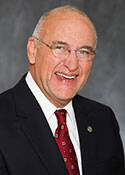Texas needs to focus on our emerging bilingual education students so that all Texas students obtain the education and economic opportunities they deserve.
Currently, Texas serves more than 5.4 million students. Twenty-one percent of those students are identified as emergent bilingual students. Emergent bilingual students refers to students who are learning English. One out of five students in Texas is an Emergent Bilingual Student.
Last session, I passed Senate Bill 560 (House Bill 2258), which directed the Texas Education Agency to develop a strategic plan to improve and expand bilingual education in Texas. This session, I filed 10 bills based on the TEA recommendations from their improvement plan.
We must expand and improve bilingual education in Texas because Texas succeeds when every Texan succeeds.
You have heard the saying that a chain is only as strong as its weakest link. That sentiment is also true in education; our system is only as strong as our weakest student.
Emergent bilingual students graduate at lower rates than their same-aged peers and are overall less ready for college, a career or the military.
Students with English as a second language often need extra help in school, not necessarily with the content but because of the language gap.
For the class of 2020, the overall graduation rate for all Texas students was 90.3%, but for emergent bilingual students it was 78.2%.
Additionally, the college, career and military readiness of all students was 63%; for emergent bilingual students, it was 44.8%.
Students who fail to graduate and lack CCMR are less likely to get adequately paying jobs, afford a home or a family, and often end up in the criminal justice systGem. Nearly 80% of all prisoners in the United States are high-school dropouts or recipients of the general educational development (GED) credential.
I want every Texan to be a law-abiding, healthy, contributing member of our communities. This is why I am laser-focused on improving bilingual education this session and have filed 10 new bills that will improve outreach about bilingual education programs, improve administrative processes to produce more bilingual educators and expand learning opportunities for bilingual students. These bills are summarized as follows.
HB 1069 develops a state seal of biliteracy that awards students who have achieved a high level of understanding of English and any other language. HB 2164 will close gaps for emergent bilingual students and improve bilingual education outcomes by providing additional monitoring of bilingual education. HB 2168 increases the number of bilingual educators in Texas by preparing high school students to choose bilingual education as a career.
HB 2169will address the inconsistency between the bilingual education allotment and the funding provided by the major education reform bill, HB 3, from the 86th legislative session. HB 2372will develop and make available training materials and other training resources to school administrators to improve their understanding of bilingual education programs.
HB 3302 and HB 3304 will create a study to develop a Spanish STAAR exam for secondary grades (6-12). HB 3303 will direct the State Board for Educator Certification to redesign bilingual education certification pathways to allow a teacher with a 7-12th-grade certification to also obtain a bilingual supplemental certificate. Finally, HB 3305 will increase funding for schools that provide a one-way bilingual education program.
My colleagues and I have a responsibility, as legislators, to do everything possible to improve the education system for all Texas students. Bilingual education students deserve these initiatives to obtain the highest quality education services Texas can offer so they can succeed at school and in the workforce.
R.D. “Bobby” Guerra, D-McAllen, represents State House District 41, which includes the cities of McAllen, Mission, Edinburg, Palmhurst, Pharr and Lopezville.



